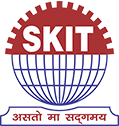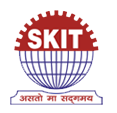Programme Educational Objectives of UG Programme
| PEO 1: |
Graduates will be able to apply their fundamental knowledge to formulate, design and execute challenging multidisciplinary projects for development of sustainable infrastructure. |
| PEO 2: | Graduates will continue their professional career as entrepreneur and will undertake innovative R & D work catering to industrial and societal need. |
| PEO 3: | Graduates will exhibit ethical approach, effective communication skills and efficient team work in multicultural environment. |
Programme Outcomes (POs) for UG Programme
| PO 1: | Engineering knowledge: Apply the knowledge of mathematics, science, engineering fundamentals, and an engineering specialization to the solution of complex engineering problems. |
| PO 2: | Problem analysis: Identify, formulate, review research literature, and analyze complex engineering problems reaching substantiated conclusions using first principles of mathematics, natural sciences, and engineering sciences. |
| PO 3: | Design/development of solutions: Design solutions for complex engineering problems and design system components or processes that meet the specified needs with appropriate consideration for the public health and safety, and the cultural, societal, and environmental considerations. |
| PO 4: | Conduct investigations of complex problems: Use research-based knowledge and research methods including design of experiments, analysis and interpretation of data, and synthesis of the information to provide valid conclusions. |
| PO 5: | Modern tool usage: Create, select, and apply appropriate techniques, resources, and modern engineering and IT tools including prediction and modeling to complex engineering activities with an understanding of the limitations. |
| PO 6: | The engineer and society: Apply reasoning informed by the contextual knowledge to assess societal, health, safety, legal and cultural issues and the consequent responsibilities relevant to the professional engineering practice. |
| PO 7: | Environment and sustainability: Understand the impact of the professional engineering solutions in societal and environmental contexts, and demonstrate the knowledge of, and need for sustainable development. |
| PO 8: | Ethics: Apply ethical principles and commit to professional ethics and responsibilities and norms of the engineering practice. |
| PO 9: | Individual and team work: Function effectively as an individual, and as a member or leader in diverse teams, and in multidisciplinary settings. |
| PO 10: | Communication: Communicate effectively on complex engineering activities with the engineering community and with society at large, such as, being able to comprehend and write effective reports and design documentation, make effective presentations, and give and receive clear instructions. |
| PO 11: | Project management and finance: Demonstrate knowledge and understanding of the engineering and management principles and apply these to one’s own work, as a member and leader in a team, to manage projects and in multidisciplinary environments. |
| PO 12: | Life-long learning: Recognize the need for, and have the preparation and ability to engage in independent and life-long learning in the broadest context of technological change. |
Programme Specific Outcomes (PSOs) for UG Programme
|
PSO 1: |
Graduates will be able to demonstrate competitiveness in use of modern tools of civil engineering. |
| PSO 2: | Graduates will exhibit improved employability skills through interaction with practitioners and field study. |
Programme Outcomes (POs) for PG Programme (Transportation Engineering)
|
PO 1: |
An ability to independently carry out research /investigation and development work to solve practical problems. |
|
PO 2: |
Ability to write and present a substantial technical report/document. |
|
PO 3: |
Students should be able to demonstrate a degree of mastery over the area as per the specialization of the program. The mastery should be at a level higher than the requirements in the appropriate bachelor program |
Programme Specific Outcomes (PSOs) for PG Programme (Transportation Engineering)
|
PSO 1: |
Demonstrate knowledge and understanding of the engineering and management principles and apply these to one’s own work, as a member and leader in a team, to efficiently manage Transportation Engineering projects in multidisciplinary environments after consideration of public health, safety, cultural, societal, environmental, economic and financial factors. |
|
PSO 2: |
Communicate effectively and confidently on complex Transportation Engineering activities with the engineering community and with society at large, such as, being able to comprehend and write effective reports and design documentation by adhering to appropriate standards, make effective presentations, and give and receive clear instructions. |





